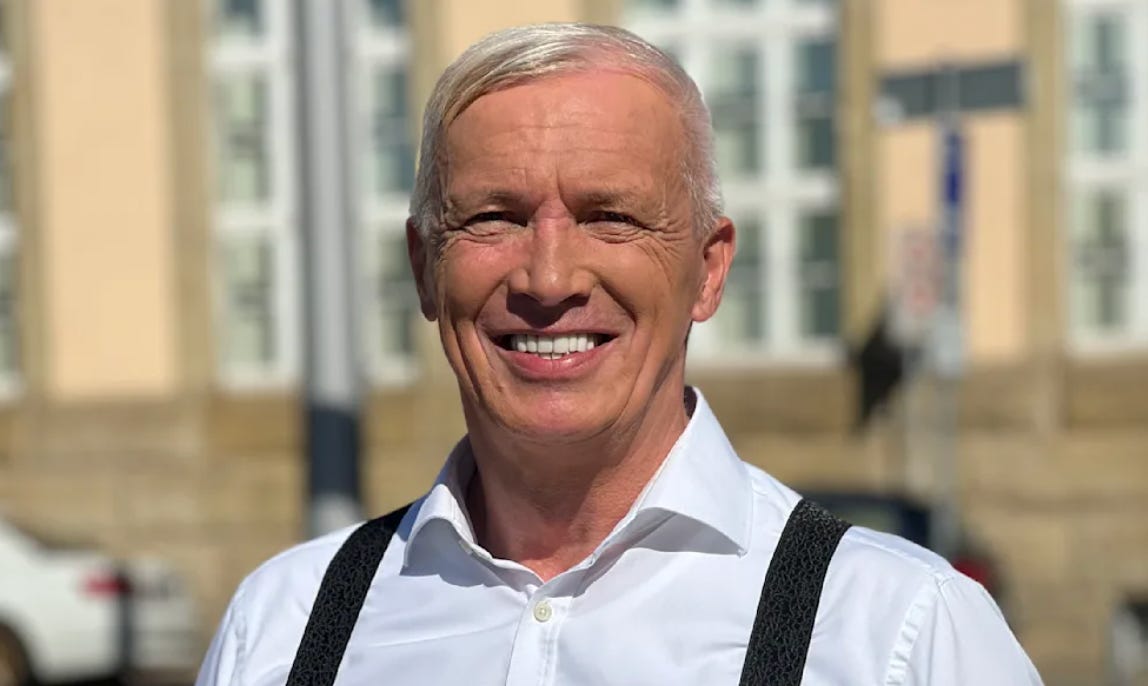AfD candidate poised to win head mayorship of Nordhausen (Thuringia); Sahra Wagenknecht announces plans to form her own protest party
As the German ruling establishment continues to alienate voters and lose ground, a new kind of politics is taking shape beneath them.

Candidates of Alternative für Deutschland continue to win high political office in East Germany. First, it was Robert Sesselmann, who won the office of Landrat in Sonneberg, Thuringia. A week later Hannes Loth was elected to mayor of the small town of Raguhn-Jeßnitz in Sachsen-Anhalt.
Now it is Jörg Prophet who is poised to become head mayor in Thuringian Nordhausen. In the Sunday election, he won over 42% of the vote, landing him well ahead of the unaffiliated incumbent Kai Buchmann, at just 23.7%, as well as the SPD and CDU candidates, who received 18.6% and 11.2% respectively. The Green candidate came in last, with just 1.4% percent, or – by my calculations – less than 350 actual votes. Please, can we have a brief pause to laugh at them. In two weeks, Prophet and Buchmann will compete in a runoff, and there’s every reason to believe Prophet will win.
This is remarkable for a few reasons. First, the university town of Nordhausen is a former SPD stronghold, where the AfD weren’t thought to command particular support. Second, unlike Sesselmann, Prophet didn’t campaign on national issues, like the energy transition and the Ukraine war. He confined his message to local problems. Third, voter participation in Nordhausen has surged, from 44.6% in 2017, to over 56% in the current election.
Thuringian state politicians like Steffen Dittes, leader of Die Linke [the leftist SED-successor party] in the state parliament, fear the “normalisation of an extreme right-wing party.” In Thuringia, the State Office for the Protection of the Constitution has classified the AfD together with its leader Björn Höcke as proven right-wing extremists. Normalising the AfD at the local level would, in the longer term, undermine barriers “that still exist at the state and federal level,” Dittes fears.
The truth is that the AfD is the leading East German political party; it is already fully “normalised” there, whatever Die Linke, the constitutional protectors, the media and other antidemocratic forces think. The establishment parties have a real problem here, and unless they can find a solution that consists of something more than scolding millions of Germans and threatening to criminalise their opinions, that problem will only get worse and worse.
Nor are all AfD voters even particularly right-wing. Especially in the East, it seems likely that a significant portion of the AfD support comes from alienated socialists. Germany’s third-most popular politician, Sahra Wagenknecht of Die Linke, has confirmed that she plans to found her own party, which will combine popular AfD positions against mass migration, pro-war Atlanticism and the stifling of domestic political discourse, with a socialist programme of price and production controls. Polling suggests up to 25% of Germans might support such a party, including 42% of easterners. The press hope that Wagenknecht’s party will form a “bulwark” against the AfD, splitting its support.
While polling about a party that doesn’t yet exist and has no candidates for office is mostly meaningless, that’s certainly a regrettable possibility. What Wagenknecht’s party will certainly do, is destroy Die Linke at the national level. They’ll lose all prospects of surmounting the 5% cutoff for Bundestag representation, and she’ll take a good portion of the party membership into her now organisation with her. All talk of an anti-AfD bulwark notwithstanding, the political establishment will not be content to tolerate Wagenknecht’s party if they see any real success. The constitutional protectors will descend on them as they have the AfD, and our rulers will find themselves locked in a two-front battle against the ever growing range of opinions that count as political heterodoxy. AfD-Wagenknecht coalitions would become a serious possibility in the East.
Despite all the media manipulations, false moralisation and legal threats, a new political order is taking shape beneath the sclerotic establishment of the Federal Republic. The discourse of the centre-left and centre-right parties has dominated Germany via managed consensus since the war, but for the first time, you can begin to glimpse an alternative politics beyond its confines. A real left and a real right are emerging as the economy shrinks and the Scholz coalition proves incapable of governing.